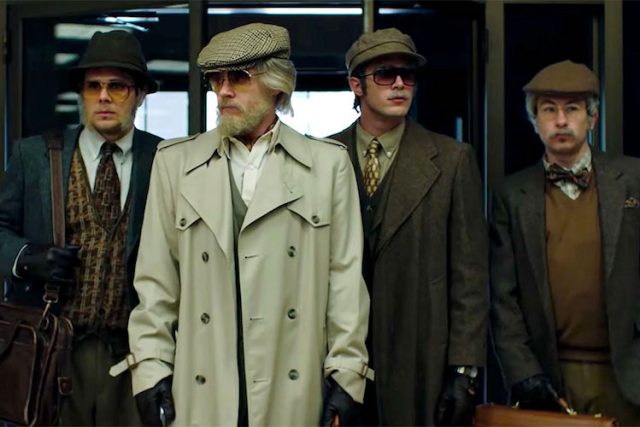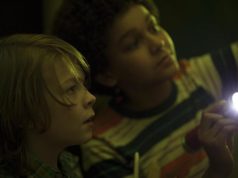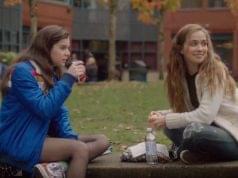
“This is not based on a true story,” say the onscreen titles at the beginning of “American Animals.” “This is a true story.” A bold assertion, but writer-director Bart Layton, whose previous film was the unbelievably engrossing documentary “Impostor,” makes a strong case for himself with his narrative debut, an account of a 2004 incident in which four Kentucky college kids tried to pull off a heist of rare books worth several million dollars.
Barry Keoghan (“Dunkirk,” “The Killing of a Sacred Deer”) and Evan Peters (TV’s “American Horror Story”) play the two main dopes, Spencer Reinhard and Warren Lipka, lifelong friends who end up at different colleges after high school. Spencer, an overachieving worrywart who is also, somehow, a pothead and a talented artist, is at Lexington’s Transylvania University (nicknamed Transy); Warren, an unpredictable class clown, is just down the road at the University of Kentucky. Spencer becomes aware of Transy’s collection of exceedingly rare and expensive books by Charles Darwin and John James Audubon, seemingly secured by no more than a single librarian (Ann Dowd), and he and Warren half-jokingly come up with the idea to steal them.
This half-joke evolves into a real (but not very good) plan requiring the assistance of two other young men, a good student named Eric (Jared Abrahamson) and a rich preppy named (what else?) Chas (Blake Jenner). The further things go, the more Spencer hopes something will happen to stop it, but he’s unable to resist Warren’s confidence, no matter how reckless or misplaced. The four plan the robbery by Googling “how to plan a heist” and by watching all the relevant movies they can get their hands on (especially “Reservoir Dogs,” which gives them the idea to use color-coded pseudonyms).
As a heist film, “American Animals” spins its wheels for too long. Layton gets so caught up in conveying the details that he seems to forget these guys are short-sighted buffoons to whom we have little emotional connection. Keoghan earns sympathy as a smart kid whose youthful arrogance gets the best of him, and Peters is always fascinating to watch as the wild card, but there’s still a sizable chunk of the movie leading up to heist day that feels repetitive and unnecessary — get on with it already, you know?
But! Drawing on his experience as a documentarian, Layton pulls a master stroke that transforms the film, incorporating real, new interviews with the actual guys into the story, even having them interact with the movie versions of themselves. (At one point the fictional Warren asks the real Warren if this is how he really remembers things, and the real Warren says, “No, but if this is how Spencer remembers it, let’s go with it.”) Layton blends documentary and dramatization in a way that I don’t think I’ve seen before, allowing each half to comment on the other. The reality-bending narrative device turns an otherwise so-so true-crime dramedy into something noteworthy.
B (1 hr., 56 min.; )





